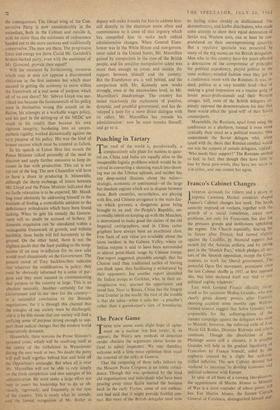Poaching in Tartary
TfiE roof of the world is, paradoxically, a comparatively safe place for nations to quar- rel on. China and India are equally alive to the insuperable logistic problems which would be in- volved in converting a shouting match into shoot- ing war on the Tibetan uplands, and neither has any deep-seated illusions about the value— strategic, economic or sentimental—of the large but desolate regions which are in dispute between them. Both countries, nevertheless, are playing with fire, and Chinese arrogance is the main fac- tor which prevents a dangerous game being brought to an end; the 'People's Republic, un- avowedly intent on keeping up with the Manchus, is determined to make good the claims of the old Imperial cartographers, and in China carto- graphers have always been an exorbitant class. Few facts of any value are available about the latest incident in the Galwan Valley, where an Indian outpost is said to have been surrounded at almost point-blank range by Chinese troops. One report suggested, plausibly enough, that the Chinese used their traditional tactics of leaving one flank open, thus facilitating a withdrawal by their opponents; but another report identified the Indian troops as Gurkhas, who, in their un- imaginative way, spurned the opportunity and stood fast. Next.to Russia, China has the longest land frontier in the world; the root of the trouble is that she takes—when it suits her---a poacher's rather than a gamekeeper's view of boundaries,


































 Previous page
Previous page